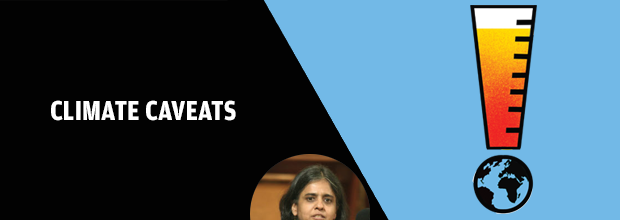|
|

|

|
| BULLETIN HIGHLIGHTS |

|
- Editorial by Sunita Narain
|

|
- Stories from Down To Earth
|

|
|

|
|
|
|

|
|
|
|

|

|

|
| Sunita Narain |
| Editor, Down To Earth |
 Twitter: @sunitanar Twitter: @sunitanar
|

|
| CLIMATE CAVEATS |

|

|
ACCEPTANCE of climate change doesn’t keep pace with our energy consumption reduction. However, the latest International Energy Agency’s (IEA’s) Global Energy and CO2 Status Report for 2018 has some good news. It offers where possible answers lie in our quest to mitigate climate change. This is what we should discuss. But transitions in energy use will be contested and even be more difficult, if we don’t factor in climate justice.
IEA’s report finds that global energy consumption is up—twice the average rate of growth since 2010. This is because of robust economic growth in the world and weird weather, ironically because of climate change. As a result, energy-related carbon dioxide (CO2) emissions are up, with the power sector accounting for two-thirds of the growth in emissions. Oil demand increased by 1.3 per cent in 2018 and so has the demand for coal. But the latter is slower and more sluggish than the period before. Still, coal- based power plants were the single largest contributor to the growth in emissions in 2018. IEA estimates that CO2 emitted from coal combustion was responsible for over 0.3°C of the 1°C increase in global temperature over the pre-industrial levels.
But here is the good news that has the potential to turn around the energy trajectory that jeopardises our future. First, natural gas is replacing coal for generation of power—roughly 24 per cent of the growth in natural gas use in the world was because it was being substituted for coal in power plants. This happened mostly in the US and also in China—where its domestic policy to clean air pollution (called the Blue Skies initiative) pushed for curtailment of coal use in industrial boilers and power plants. Without this shift, CO2 emissions would have been 15 per cent higher, estimates IEA. However, we need to note that gas does have higher methane emissions—a potent greenhouse gas (GHG)—and this is not accounted for by the IEA assessment in its CO2 balance sheet..Continue Reading 
|

|
| Announcements - Trainings & Events |

|
|

|

|
|
|

|
|
|

|
|
Please visit
www.cseindia.org for more training programmes and announcements.
|

|
| From Down to Earth |

|
|

|
|
|
|
|
| |
| New Publications |

|
|
| |
| |

|

|

|
|
Optimizing the Third Skin
|
|

|
|
Download
|
|

|
|

|
|
|

|

|

|
|
Climate Change Reader for Universities
|
|
|

|
|

|

|

|
|
Charting the future of City Compost
|
|
|

|
|

|
|
|

|

|

|
|
Assessment of Excreta Management
|
|

|
|
Download
|
|

|
|

|
|
For more titles, please visit
www.cseindia.org or write to
rchandran@cseindia.org
|

|
| Jobs At CSE |

|
|

|
|
|

|
|
|

|
|
|

|

|
View More Jobs 
|
|

|
|

|

|

|
|
You are receiving this newsletter because you have asked to be included in our mailing list, attended a CSE event or requested information.
Unsubscribe click here
, for queries and suggestions: Please add vikas@csebooks.org in your Address Book or Safe Sender's List. Gmail users, kindly drag our email to the primary folder.
|

|
Best Regards,
Team CSE
|
| |
|
|

|
|

|
|
|

